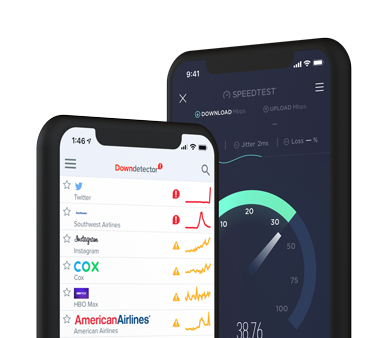Best Internet Providers in Phoenix, Arizona for 2025
Compare the Best Internet Service Providers in Phoenix, AZ
Not all plans are available in all areas. Provider plan, availability, and speed tier data provided by BroadbandNow.com. Speedtest real-world data is only present where sample size has reached significance within a region. Additionally, averages may include aggregated tests across multiple Internet Types (Fiber, DSL, Cable, etc.).
Here at Speedtest, we take great pride in delivering precise and credible data that underpins our ISP assessments. This information is diligently compiled from the Speedtest results submitted by millions globally, ensuring our analysis of ISP performance stands as both dependable and up-to-date. This allows us to furnish a transparent, impartial overview of ISP efficacy.
To accurately judge an ISP's service, three critical metrics should be considered: download speed, upload speed, and latency. Download speed is paramount for actions such as streaming and downloading, influencing the rate at which data reaches your device. Upload speed is crucial for posting content and partaking in virtual interactions, as it indicates the speed at which data is transmitted from your device to the web. Latency, or ping, plays a vital role in online gaming and video calls, impacting how responsive your connection is. Armed with a holistic grasp of an ISP’s offerings, you're equipped to make choices suited to your unique internet needs.
The technology behind an ISP is significant in determining your online experience's quality. Fiber optic technology typically delivers the fastest speeds, ideal for demanding web activities. Cable internet, more commonly available, usually offers commendable download speeds, though its upload speeds may be lacking. DSL provides moderate speeds that can accommodate basic web browsing and streaming, while satellite internet, often the sole option in remote areas, is known for its higher latency and reduced speeds.

How Much Speed Do I Need?
Download speeds of at least 100 Mbps and upload speeds of at least 10 Mbps are widely considered fast enough to handle nearly any online activity. A quick guide to what speeds you need for different online activities is below, and you can read our full guide to internet speeds and performance for more information. Keep in mind that the numbers below are the bare minimum for one device at a time. If you’re trying to use multiple devices on a network at the same time, you’ll want higher speeds.
0–5 Mbps (Slow)
- Stream SD video
- Connect on Slack
- Use Microsoft Teams
- Write and read email
- Scroll social media
- General web browsing
5–20 Mbps (Better)
- Stream HD video at 1080p
20–40 Mbps (Solid)
- Stream 4K video
- Play games online
40–100 Mbps (Good)
- Stream HD games
100+ Mbps (Fast)
- Engage in multi-player gaming
- Download huge files
1+ Gbps (Very fast)
- Do anything you want on multiple devices
ISP Speeds in Phoenix, AZ
In Phoenix, Arizona, Cox stands out with the fastest recorded median download speed based on our proprietary real-world Speedtest data and showcases a respectably fast 281 Mbps. This exceptional speed from Cox, as well as a competitive ISP landscape in the Phoenix area, means that area residents that value speed have options so that they can enjoy seamless streaming, gaming, and downloading experiences.
Among the other providers, Quantum Fiber boasts the highest advertised maximum download speed at 8 Gbps and is followed closely by AT&T Fiber with 5 Gbps. These speeds highlight the potential for ultra-fast internet connectivity in Phoenix, especially for services that include fiber, which is known for its faster speeds and reliability. However, it's important for consumers to note there might be a discrepancy between advertised and actual speeds which could impact their real world experiences.
A good rule of thumb to keep in mind is that download speeds of at least 100 Mbps and upload speeds of 10 Mbps are considered fast enough for nearly any online activity. These speeds support streaming 4K HD videos, downloading large files, and playing HD games on multiple devices simultaneously. The significance of speed increases with the cumulative use of the internet across various devices. For households with high internet demand, whether from work-from-home setups or multiple users, it might be wise to think about a service with speeds that surpass the 100 Mbps download and 10 Mbps upload benchmarks. Internet usage is cumulative, meaning the number of connected devices is a critical factor in determining your required speed.
Phoenix Fixed Speeds
Download Mbps
Median download speed
Upload Mbps
Median upload speed
Latency ms
Median latency
To be added to this list for mobile or fixed broadband, 75% of a city's monthly unique user totals over a 13-month period must have a minimum of 200 monthly unique user results. To be updated for mobile or fixed broadband, 75% of a city's monthly unique user totals over a 13-month period must have a minimum of 100 monthly unique user results.
An operator or ISP must account for 3% or more of total test samples in the market to be on this list. We display data if at least two operators or ISPs meet this threshold in a designated region or city.
Internet Providers in Nearby Cities
- Apache Junction
- Avondale
- Buckeye
- Bullhead City
- Camp Verde
- Casa Grande
- Casas Adobes
- Catalina Foothills
- Cave Creek
- Chandler
- Chino Valley
- Cottonwood
- Cottonwood-Verde Village
- Drexel Heights
- El Mirage
- Flagstaff
- Florence
- Fort Mohave
- Fortuna Foothills
- Fountain Hills
- Gilbert
- Glendale
- Gold Canyon
- Goodyear
- Green Valley
- Kingman
- Lake Havasu City
- Marana
- Maricopa
- Mesa
- New Kingman-Butler
- New River
- Nogales
- Oro Valley
- Page
- Paradise Valley
- Payson
- Peoria
- Phoenix
- Prescott
- Prescott Valley
- Queen Creek
- Sahuarita
- San Luis
- San Tan Valley
- Scottsdale
- Sedona
- Show Low
- Sierra Vista
- Sierra Vista Southeast
- South Tucson
- Sun City
- Sun City West
- Sun Lakes
- Surprise
- Tanque Verde
- Tempe
- Tolleson
- Tortolita
- Tucson
- Yuma
Home Internet in Phoenix
Phoenix, a vibrant, sprawling metro in the heart of Arizona, offers its residents a diverse array of internet types. Everything from DSL and fiber to cable, satellite, and 5G internet are on offer which allows Phoenix families and businesses the liberty of choice when it comes to what might be best for their needs. Providers like CenturyLink and Cox deliver the reliability of DSL and cable options, while the future-forward fiber internet is represented by AT&T Fiber and Quantum Fiber, ensuring blazing speeds and robust connectivity for subscribers.
Cox and CenturyLink emerge as the ISPs with the highest terrestrial service coverage in Phoenix, excluding satellite and fixed Wireless providers. With Cox's extensive 83.38% coverage and CenturyLink's significant presence, residents have robust options for reliable and widespread internet service. This high availability ensures that a majority of Phoenix households can choose from providers that promise high-speed connections and a range of internet types tailored to different needs without having to rely on satellite or fixed wireless options whose coverage can be somewhat spotty.
The average starting price for internet providers in Phoenix is $59.82, a price that's just about average for metropolitan areas. For those seeking more budget-friendly options, Cox offers the lowest starting price at $30 a month, although their plans' prices scale go up as the maximum advertised download speed of their plans increases up to 2 Gbps. While enticing, it's critical for customers to remember that advertised maximum speeds may not always align with real-world experiences, and plan prices can fluctuate, offering a caveat for potential subscribers.
How we test the speed of ISPs
Speedtest is the definitive way to test the performance and quality of an internet connection. Millions of users like you use Speedtest.net and our Android and iOS apps every day to test internet performance (including bandwidth, latency, coverage, video metrics, and more) in real world situations. We then use rigorous scientific approaches to aggregate and anonymize those results to empower people like you with content like this so you can understand and optimize your internet experience.

The data found within has not been subjected to the rigorous Speedtest marketing claims and data methodology, and therefore cannot be used in commercial applications. Additionally, promised speeds and plans offered are always subject to change.
How to test your internet speed
Speedtest can help you test the speed and overall performance of your internet for free from any device. Click here to open a new page and take a Speedtest. You can then compare your results with what you’ve learned about internet performance near you. If you aren’t getting the results you expect, you can either use this guide to use your Speedtest results to talk to your internet provider or you can shop for a new provider.




















